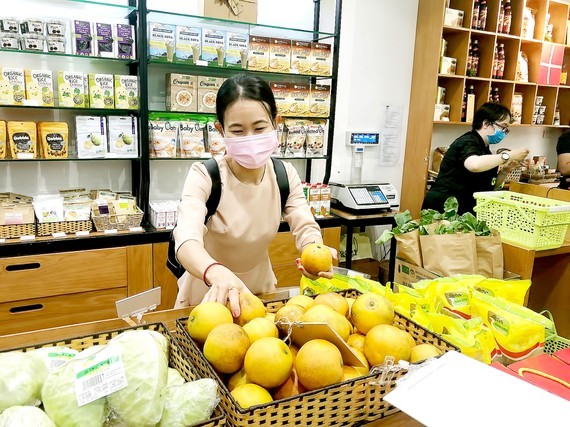
Attraction from the organic market
In mid-November this year, the fair Organic Town - Gis Market was held by the Business Association of High-Quality Vietnamese Products, Global Integration Standards Project, BSAS Company, and Vinamit Joint Stock Company, at 84 Nguyen Du Street in District 1 in Ho Chi Minh City.
On opening day, the fair attracted lots of consumers, causing many products to be sold out. Since then, regularly on the weekends, the fair is crowded with buyers and sellers. Ms. Vu Kim Hanh, Chairwoman of the Business Association of High-Quality Vietnamese Products, said that that was the first time they had chosen standard products to meet the needs of consumers. They tried to create trustworthy spaces for consumers, showing them the difference in standards, quality, and other factors. That was a new step, to connect more closely with consumers.
Mr. Nguyen Lam Vien, Chairman of the Board of Directors, CEO of Vinamit Joint Stock Company, said that the launch of the Organic Town - Gis Market expressed the desire of enterprises to introduce and provide consumers with organic products and products that meet international standards. Not only helping producers and consumers, but the fair also helps startups that want to change different business methods.
To meet the consumption demand for products with high safety standards, recently, most supermarkets in HCMC have also arranged separate shelves for organic goods, OCOP (one product per commune program) products, or organized alternately fairs to introduce specialties of regions. The director of a supermarket said that the revenue from this group of products had seen outstanding growth, with an average of 15-20 percent per year. Even in 2020, when the purchasing power of many other items decreased sharply, the group of safe products has still ensured the growth plan. The main reason is that consumers tend to choose healthy foods, especially those whose production does not affect the environment. It has motivated the constant search for capable enterprises and suppliers to diversify products, creating more choices for customers.
Inevitable trend
The latest report by the Industry and Trade Information Center under the Ministry of Industry and Trade states that organic agricultural development is currently a common trend in many countries. Specifically, there are 50.9 million hectares of organic farming worldwide, and the market potential is up to US$81.6 billion.
Vietnam currently has 33 out of 63 provinces and cities that have developed organic agriculture, with an area of more than 76,600 hectares, an increase of 3.6 times compared to 2010. About 60 corporations, enterprises, and production facilities have invested in organic farming - a field considered to have favorable conditions for development in Vietnam. The consumption of organic foods has become a new trend in Vietnam.
According to the consumer confidence index report of market research groups, like Neilsen and Kantar Worlpanel, health is their biggest concern. Consumers are also more cautious about finding and using healthy foods. They prioritize using products that do not contain food coloring, aroma compounds, and artificial preservatives, and they also prefer sugar-free and low-fat foods.
Especially, consumers are willing to spend 20-25 percent higher on organic products. It shows that the quality of life and the demand for clean products are getting more and more attention. The increasing demand has made organic food more and more abundant and popular.
The production standards of organic foods are considered to be the highest quality standards in the world because the production process follows extremely strict regulations that require proper investment. Mr. Tran Phong Lan, Director of Hai Au Agricultural Development Joint Stock Company, shared that the company's butternut squashes received organic certification from Japan. Catching the consumer need for convenience, Danny Green – the company’s brand – has produced butternut squash milk. And it will introduce butternut squash powder soon. According to Mr. Tran Phong Lan, the way to get organic certification is very long and hard. However, the company has determined that it will be a trend when people’s awareness is improved, and smart consumers will know which kind of foods is good for health, then organic products will thrive.
Mr. Pham Thai Binh, CEO of Trung An High-Tech Agriculture Joint Stock Company, said that in the past, organic rice had been grown only in the company's fields. But this winter-spring rice crop, Trung An is applying organic farming on an area of 1,500 hectares, on the fields that it has associated with farmers.
“We worked with farmers to implement all technological processes without using pesticides and chemicals in the fields. Farmers have agreed because we pledged to provide seeds, fertilizer, and biological products and ensure rice production for them. It shows that farmers understand the harms of chemical farming, which affects health and land. Meanwhile, organic farming will have more benefits because neither income will be reduced nor health is affected,” he said.
























